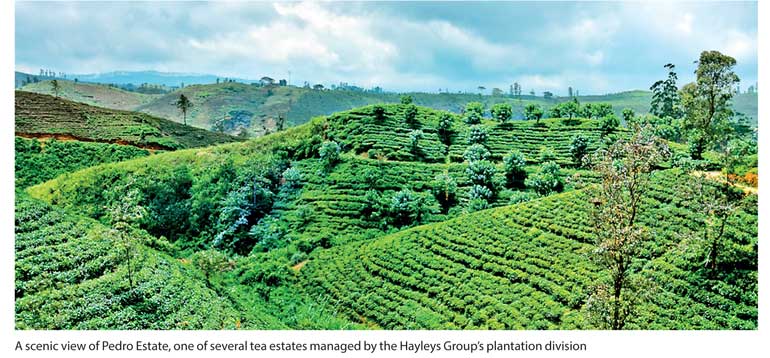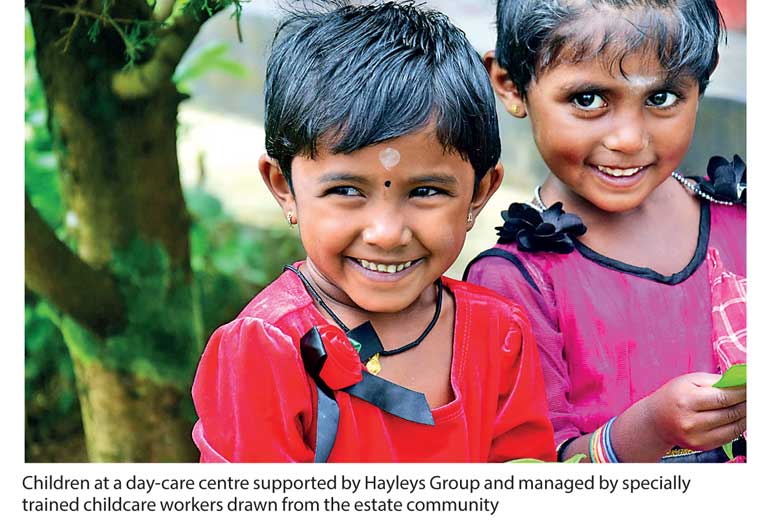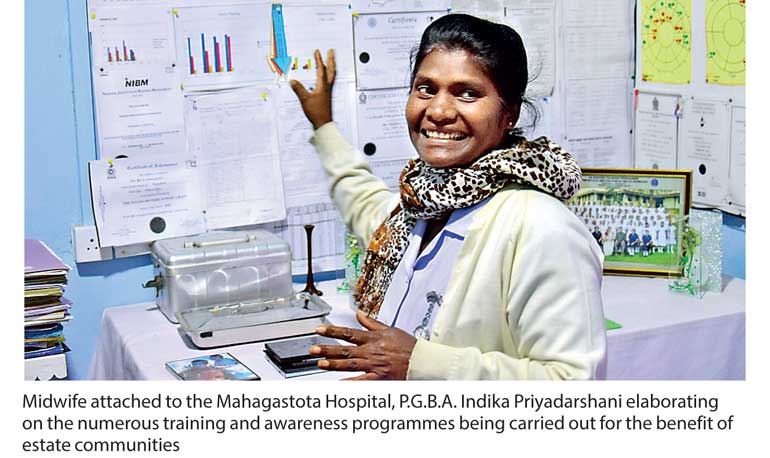Saturday Feb 07, 2026
Saturday Feb 07, 2026
Friday, 17 March 2017 00:00 - - {{hitsCtrl.values.hits}}

Sri Lanka’s tea industry continues to grapple with chronic systemic challenges in the form of steadily increasing costs of production, low rates of productivity, and an exodus of labour out of the island’s estate communities. Meanwhile, the impending effects of climate change, instability in traditional export markets and the rise of large-scale, low cost, international producers loom large over an industry which has been intrinsically bound with the Sri Lankan identity for well over 150 years. Despite an unbroken legacy of quality, the previous status enjoyed by Ceylon Tea no longer seems assured.
Faced with mounting operational losses, the island’s most innovative regional plantation companies are seeking out a new model for the Plantations; one capable of sustaining the industry over the long-term while supporting an estate community population of over one million Sri Lankans.
Over the last decade, Hayleys Plantations has been leading the charge through the implementation of a series of bold initiatives across its two pioneering plantation sector companies, Talawakelle Plantations and Kelani Valley Plantations – initiatives which could potentially hold the key to reversing the fortunes of an ailing industry. The Hayleys approach aims to resolve long-standing challenges within the tea industry by sincerely addressing the Human Resource Management issues that lay at the root of the industry’s current difficulties.
Through concerted efforts to improve the social and economic standards of its 20,000 direct workforce and its 110,000 strong extended plantation community, Hayleys has worked to ensure that these communities are given a meaningful stake in the profitability of its plantation sector. The company has made employee welfare the lynchpin of its strategy for raising productivity and quality, parallel to its efforts toward crop diversification and the implementation of new agricultural processes and techniques.
In practice, these HRM programmes can broadly be categorised into healthcare, economic empowerment, education, nutrition, housing, and a concerted set of social welfare programmes organised around five key development drives: Zero Anemia for a healthy life, 100% attendance at work for increased earnings, creating a better future for families, ensuring clean and tidy working and residential conditions and maintaining a healthy lifestyle with nutritious food for a better quality of life.
Improving the quality of life of its workers has been an important aspect of the Company’s business strategy since its inception in 1992. In furtherance of this policy, the Company pledged its support to the Global Compact charter in March 2006. As the Company brought its HR practices into alignment with the Compact’s vision and objectives, a structured CSR programme for Kelani valley plantations PLC began to emerge. This was the genesis of the ‘A Home For Every Plantation Worker’ initiative, launched with the objective of upgrading the lifestyle and standard of living of the plantation worker by addresses living environment, health and nutrition, community capacity building and empowerment of youth.
The ultimate goal of this initiative is to provide a contented family life for all our Plantation communities.
As with any Human Resource initiative, the Hayleys approach to implementation is pivotal to its success. In that regard, the company’s top-level management, from its Managing Director Roshan Rajadurai, Kelani Valley Plantations Director/CEO Sarath Siriwardena, Talawakelle Tea Estates Director/CEO Dilantha Seneviratne, and both companies’ teams of Directors and General Managers down to its Estate Managers and Assistant Managers, Corporate Management including the HR division headed by Senior Manager HR and Corporate Sustainability Anuruddha Gamage maintain a close-knit, meaningful, relationships with estate workers and communities.
These efforts are also given invaluable supported by company’s highly dedicated Human Resource teams through ground-level initiatives driven by Human Development Manager S. Ram. By developing these engagements, the company recruits Human Resource Development (HRD) Executives directly from its estate communities in order gain a deeper understanding of the day-to-day needs of its workforce while making strategic interventions to further its wider community development goals.
Over time, this approach has coalesced into a system that is uniquely adapted to serve the needs of workers, families, and communities. By organising the company’s entire organisational hierarchy into a single unit working toward the goal of ensuring a better life for plantation workers, the company has been able to drive holistic improvements within its plantations, ultimately bolstering the bottom line and serving as a beacon for the wider tea industry.
Similarly consolidating on its promise to ensure the welfare of its employees ‘from womb to tomb’ Hayleys Plantations has over the last decade partnered up with estate communities, state institutions and local and international NGOs to implement a series of initiatives designed to safeguard and improve the health of communities based around Talawakelle Plantations and Kelani Valley Plantations. The scope of these healthcare initiatives has been organically expanded to cover an increasingly wider breadth of healthcare issues.
Commencing from a strict focus on ensuring the basic nutritional requirements for its work force and the wider estate community, the company rapidly expanded the scope of its programme to include free medical assistance, awareness building programmes and interventions aimed at educating and safeguarding vulnerable segments of the estate community from preventable diseases and healthcare risks – with a particular emphasis on maternal healthcare.
A clear example of this process in action is the Mahagastota Estate Hospital, which provides healthcare services to the estate community in Kelani Valley Plantations. Medical staff drawn and trained from the surrounding community conduct informative and engaged post and antenatal clinics that target not only pregnant women but also their partners in order to ensure that both parents are educated, engaged, and take an actively share in the healthcare of their partners and children.
Sharing her experience on providing guidance and care to pregnant women in the area D.P. Hemamali of the Mahagastota Estate Hospital detailed how she and her team gathered detailed records of each and every pregnant woman from their first trimester in order to ensure the safety of both the mother and the infant.
“From experience we know that if we take measure to keep both the mother and the father informed about the nutrition requirements and the growth of the infant, we can ensure better care for the child and the mother.”
“The Hospital provides essential supplements to women throughout their pregnancy and guides the families to become first-rate care givers during early childhood. From our own experience we have learned that the formative years are the most crucial part in a child’s development and so that is where the main focus of our efforts in maternal healthcare are directed,” said P.G.B.A. Indika Priyadarshani, an experienced midwife attached to the Mahagastota Estate Hospital.
Nutrition therefore plays a major role in increasing the quality of life. Through its HRM programmes, Hayleys has worked towards ensuring that plantation workers understand the value of proper nutrition and how to correctly supplement their diet in order to derive adequate nutrition for themselves and their families. These efforts have been further developed through assistance provided to families – both through the provision of education, plant material and land – to cultivate home gardens from which they source fresh fruit and vegetables
“Years ago, we used to subsist mainly on flour roti and plain tea. But today, with the assistance of the company, we now pay much more attention to what we eat. We get fresh milk from the estate and eggs too from the hens that we keep,” commented Sarojinee, a long-standing plantation worker.
In addition, the Health and Nutrition segment of the ‘Home for Every Plantation Worker’ also implements awareness programmes on critical health issues such as HIV, tuberculosis, oral cancer and dengue. To date the programme has carried out over 467 free dental clinics, 944 eye clinics and 1,100 cataract removal surgeries and continues to make major positive impacts to the health standards of the communities residing in proximity to the Mahagastota Estate.
Parallel to its housing and healthcare initiatives, Hayleys Plantations also places significant emphasis on community capacity building. These capacity building initiatives form the connective tissue the binds the company’s wider Human Resource Development agenda together with the ultimate goal of creating and sustaining a better quality of life for all plantation workers.
The company provides comprehensive assistance with livestock management and home gardening as part and parcel of its community capacity building vision which has been organically incorporated into the ‘Home for Every Plantation Worker’ concept. Such measures are further supported through the provision of frequent and reliable micro finance assistance projects and financial consultancy programmes designed to encourage empowerment, entrepreneurship, and self-determination among plantation communities.
Apart from economic empowerment, the company provides societal support functions on behalf of its workers such as Day-care and Pre-School facilities for estate worker’s children; all of which is managed by dedicated childcare professionals cultivated and trained from within these communities. The company’s awareness-building initiatives and social interventions have also helped make a strong impact on broader social issues affecting the plantation community such as alcoholism prevention and domestic violence through the facilitation of workshops, clinics, and street dramas.
“Through our digitalised and transparent evaluation programme, we strive to provide each and every one of our employees to reach their potential. We use the HRIS (Human Resources Information Management System) to collect and evaluate employee performance data and I am happy to say that I know of committed field officers who have reached the level of Assistant Manager purely based on their performance,” commented Anuruddha Gamage, Senior Manager – Human Resources, Hayleys Plantation Sector. While the company provides leadership development programmes for employees, estate worker’s children can benefit from the numerous educational and vocational programmes carried out through the Home for Every Plantation Worker CSR initiative.
“The Estate loan scheme gave me an opportunity to obtain a loan to help my son with his higher studies,” commented an Estate Worker whose son had managed to secure a place at the Eastern University, Sri Lanka,” Sarojinee’s son explained.
Sathiyaseelan Heroshan is yet another such individual who is currently working as a trainee at the Government Information Department following his degree in Mass Communications at the Eastern University.
“While I was raised on the estate for most of my school career, we were given enough support from the company to develop our skills through education and I feel that this is the way of the future for the youth of our community. I am looking to gain enough experience through my work to develop commercial skills in graphic design. Technology is opening up new opportunities for us and while some prefer to earn their way in the plantations, we are also getting the chance to find new career paths,” Heroshan explained.
While labour shortages are already creating issues within the plantation supply chain, Hayleys has nevertheless adopted a policy that enables members of these communities to develop, grow and if they so choose, leave the plantation sector altogether.
At the same time, the company is knocking down barriers and breaking away from colonial-era mentalities to upward mobility within the plantation company itself, thereby enabling those who choose to remain in the sector to rise up the ranks from field work into managerial positions; diversify their work into community service, or starting up their own private businesses.
“If success is measured by numbers, I am proud to say that with our overall strategy of creating a quality living space for plantation workers is providing powerful results both for the company and equally importantly for these communities.
“In a few short years we have managed to bring down absenteeism rates by 10% while plantation yields have also recorded similarly significant improvements. Meanwhile from a social standpoint, we have been able to extend comprehensive housing, healthcare, and education facilities to these communities and we are fully committed to maintaining these programmes,” commented Anuruddha Gamage.
Hayleys Plantations aspires to find a solution to the complex challenges that the industry faces by placing Human Resource Management tactics at the core of its business process and by changing the environment in which these problems occur. In this manner Hayleys Plantations aims to make its estate workers the lynchpin of their plans to improve productivity, and quality thereby carving out a viable and ultimately long-term sustainable path for the industry. 

